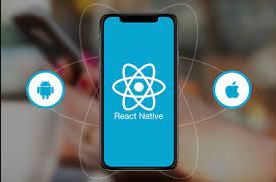
Today, programmers worldwide are increasingly interested in creating apps that run on several platforms. In addition, React Native must be mentioned whenever the topic of cross-platform development is discussed. Mobile app developers can save time and create apps more quickly with the help of the React development Company.
In 2015, Facebook created React Native for iOS, then later that year, for Android. As a result, developers now have a framework to design apps for both iOS and Android simultaneously, without sacrificing the native performance, feel, or look of either platform’s apps. First developed on iOS and then ported to Android, React Native Company received significant simplification when Facebook switched to a single development repository.
What is React Native?
React Native allows developers to create iOS and Android native mobile apps using JavaScript, Facebook’s universal programming language. “React Native uses the same essential building pieces as traditional iOS and Android apps,” reads a description of the Facebook app on the official React Native site. JavaScript is all you need to put those pieces together.
With the advent of React Native, programmers now have a better chance of sharing code between mobile apps and the web. Using React Native, programmers can create a single version of an app that works on both iOS and Android. Instead, they can recycle their code between platforms with ease. One of the most impressive things about React Native is how similar it looks to an app written in the device’s native language (Objective-C or Java).
Why You Should Use React Native to Build Your Mobile App
Reusable Code
Thanks to React Native, cross-platform development is simplified. It’s because JavaScript provides ready-made libraries that developers can leverage. The ability to reuse code is built into React Native, which helps to boost productivity, cut down on expenses, and speed up the development process. You can access to pre-existing open-source libraries, including UI libraries, also speeds up mobile app design.
Hot Reloading
React Native includes a hot reloading capability for rapid response to code changes. This update also applies to the app’s loading process. When you modify using the live functionality, the whole program will refresh without you having to do a thing. On the other hand, the hot reloading reloads just the modified bits. That facilitates a more manageable approach to both development and testing. Hot reloading promotes more rapid, straightforward, and productive application development.
Supports Cross-Platform App Development
To hear it from a developer, building and maintaining an app for iOS and Android is a significant pain point. Because they were initially written in foreign tongues is the primary reason. It makes use of not only a variety of linguistic styles but also of logical and conceptual frameworks.
When only one platform is used, users are guaranteed a consistent experience regardless of where they access the content. A talented and experienced JavaScript developer who is also familiar with native APIs, native UI libraries, and hybrid app development is all you need for cross-platform work.
A talented and experienced JavaScript developer who is also familiar with native APIs, native UI libraries, and hybrid app development is all you need for cross-platform work. Faster App Development
Almost five years have passed since React Native’s creation. And throughout this time, it has established a large and ever-expanding online support group. In addition, many valuable parts are already available to programmers. That eliminates the need to start from square one.
Using a single code base to build a React Native app dramatically lessens the likelihood of encountering errors. It allows you to develop an MVP (minimum viable product) rapidly. It won’t take long for you to release the initial edition of your app. This iteration would be stripped down to its essentials regarding features and performance.
Third-Party plugins
For those working with React Native, many online libraries are at their disposal. And as time goes on, that sum will grow. Developing an app from the ground up, especially one that relies on entirely new software can be costly and time-consuming.
You can get past this difficulty by recycling already-existing parts. Consequently, this is where external plugins come into play. You can avoid using certain Web View features by installing these external plugins and linking the plugin to a native module with React Native. These settings allow for quicker loading times and improved performance. Having this skill also aids in recalling information.
Performance
Using the graphics processing unit (GPU), React Native delivers lightning-fast performance. Some individuals still insist that nothing can match the performance of a well-written native app. However, the version of React Native is nearly on par with native solutions. Among the many advantages of using React Native over WebView-based technologies is that it provides smooth performance at frame rates of up to 60.
Easier Debugging
Finding issues is simplified when one codebase serves both iOS and Android. Yes, that’s a tremendous sigh of relief. Any programmer will tell you that debugging is a tedious and unpleasant task. The reason is that finding the precise location where the developer erred in syntax can take work hours for the testers.
With React Native, your team won’t have to waste time bouncing between two codebases. It is because fixing a defect in one operating system will result in the bug being gone in every other system.
Developer Availability
The abundance of both support and developers makes React Native an attractive option. React Native has Facebook’s support and a sizable user base. The platform is kept up-to-date by Facebook’s engineering team, ensuring its continued usefulness.
More experts in app development for the React Native platform have emerged thanks to JavaScript. JavaScript’s maturity and a wide variety of applications shorten the learning curve for new developers.
You can organize more agile teams of developers, designers, quality assurance engineers, etc., with React Native. Forbes claims that smaller teams are more likely to be creative and invested, providing even more justification for opting for React Native.